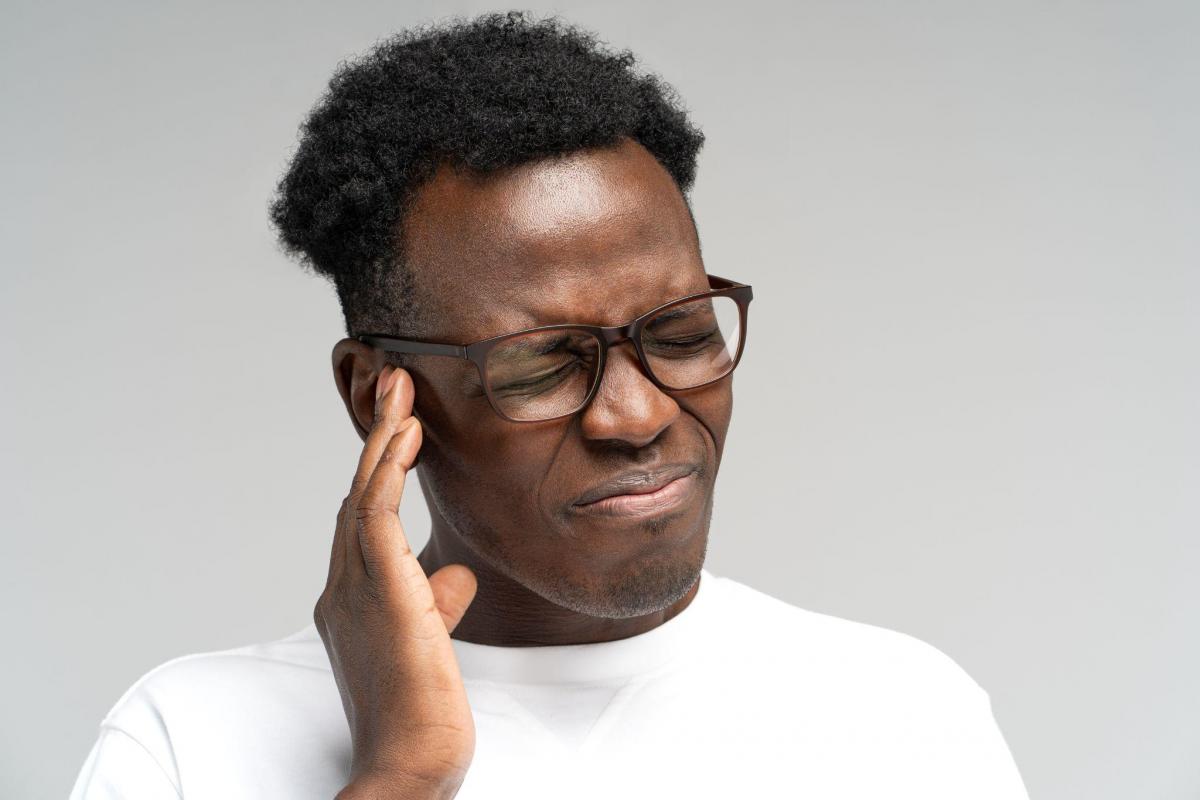
Persistent Ringing in the Ears: What Causes Tinnitus?
Tinnitus is the medical term for ringing in the ears. In most cases it’s not caused by external sound, and other people usually can’t hear it. Tinnitus is common, affecting millions of people in the U.S.1 It’s unclear what causes tinnitus, but most people who experience it have some degree of hearing loss.1,2
What does tinnitus sound like, and does it get worse over time? Can ear wax cause tinnitus? We’ll answer these and other questions ahead and explore tinnitus symptoms, causes, and treatment options.
Types of Tinnitus
Sick African American man suffering from tinnitus, throbbing earache, tired of noise.
There are two main types of tinnitus: subjective and objective.2
Subjective tinnitus is when you hear sounds in your ears, such as ringing or buzzing, that other people can’t hear and that have no external source. This is the most common type.2
Objective tinnitus is a rare type of tinnitus that causes noises in the ear that other people can also hear.
Tinnitus may also be broken down into one of several subtypes, depending on your specific symptoms.
You may experience tinnitus in both ears (bilateral tinnitus) or one ear only (unilateral tinnitus).3
Tinnitus Causes
The cause of ringing in the ears varies. Damage to the ear structure, certain medications, and certain medical conditions are all possible causes of tinnitus.1
Ear damage
One theory suggests that damage to the inner ear can interfere with the conduction of sound or disrupt how your brain processes electrical signals.1 Some people experience tinnitus from listening to loud music (especially through headphones or earbuds) or from regular exposure to loud machinery, such as jackhammers or chainsaws.1
Medications
Diuretic medications, aspirin, certain antibiotics, antimalarial drugs, and some anticancer drugs can cause tinnitus.1 Let your doctor know if you take any of these medications.
Medical conditions
Several medical conditions are risk factors for tinnitus. These include ear infections, heavy earwax, head or neck injuries, temporomandibular joint disorder (TMJ), Meniere’s disease (which affects hearing and balance), thyroid disease, and even high cholesterol or high blood pressure.1
Diagnosing Tinnitus
ENT physician checking patient's ear using otoscope with an instrument
Your doctor may be able to diagnose tinnitus based on your symptoms alone, but pinpointing the exact cause can be challenging.
Try to describe the noises you are hearing in as much detail as possible. Different types of sound in the ear may point to specific causes.
Your doctor will examine your ears and may use a series of tests and diagnostic tools to find the root cause. Common tests include:
- Hearing (audiological) exam to test how well you hear different sounds and pitches
- Movement exam (to check your eyes, jaw, neck, arms, and legs)
- Imaging tests (such as a CT scan or MRI scan)
- Lab tests (for anemia, thyroid problems, vitamin deficiencies, or heart problems)
Many people have what’s called “idiopathic” tinnitus.3 Idiopathic means there’s no known cause. While there’s no cure for idiopathic tinnitus, there are treatments that can reduce or help manage your symptoms.
Treating Tinnitus
For some people, tinnitus treatment can be as simple as removing excess ear wax. Others may need more extensive treatment, such as surgery to fix a blood vessel condition.1,3
A hearing aid may improve symptoms of tinnitus for people with age-related hearing loss.1,3 Some people benefit from using white noise machines or masking devices (similar to a hearing aid) to make symptoms less noticeable.1,3
For people with tinnitus caused by TMJ disorder, a dental adjustment or realignment may help reduce or eliminate tinnitus symptoms.1,3
Medications can help treat anxiety and depression symptoms some people experience due to their tinnitus. Counseling also helps some patients.1,3
Certain lifestyle changes, such as exercise and mindfulness-based meditation or stress reduction techniques, may also help.1,3
Get Treatment for Tinnitus at Crystal Run Healthcare
Tinnitus can interfere with daily life, causing distress and frustration. If your child or you are experiencing persistent ringing in the ears or other sounds, such as buzzing, clicking, whistling, or roaring, it’s time to see a doctor.
Finding out what’s causing your tinnitus is the first step in treating it. The expert otolaryngologists (ear, nose and throat doctors) and audiologists at Crystal Run Healthcare work together to diagnose and treat tinnitus in adults and children.
Learn more about our otolaryngologists and book an appointment with a Crystal Run ear, nose, and throat doctor today.
Sources:
https://www.nidcd.nih.gov/health/tinnitus
https://www.ata.org/about-tinnitus/why-are-my-ears-ringing/
https://www.healthline.com/health/tinnitus

 Optum Radiology at Crystal Run Healthcare
Optum Radiology at Crystal Run Healthcare Request medical records online
Request medical records online